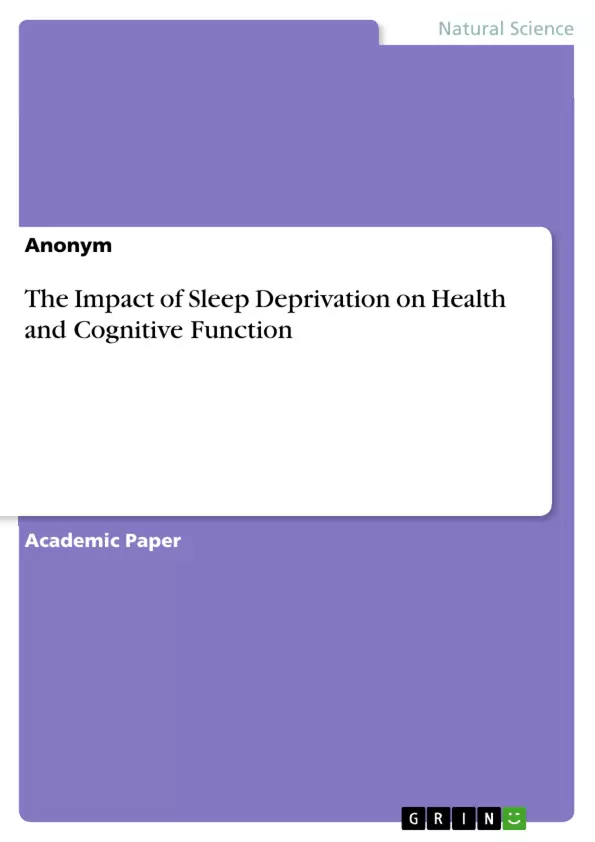Sleep is a complex phenomenon that is essential for the normal functioning of human beings. Although essential, due to the fast-paced nature of society today, there is the general ‘need’ for individuals to increase their output and they do so by cutting short their sleep time - this leads to sleep deprivation. As a result, sleep deprivation is becoming an increasing public health concern. This study presents a literature review that seeks to build knowledge on the impact of sleep deprivation on health and cognitive function. It is an examination of the causes through the management of sleep deprivation and it considers the rising concern of sleep deprivation by highlighting the associated health problems that the aforementioned problem presents. Studies suggest that adults and children alike are losing sleep for reasons like prolonged use of electronic devices, huge workloads, shift and school work, jet lag, and some other lifestyle factors. In the case of the elderly, however, the process of aging generally causes disturbances in their sleep pattern which leads to sleep loss. It was noted at the end of this study that there is a strong relationship between chronic sleep loss and many health problems like neurodegenerative disease, diabetes mellitus, cardiovascular disease, stroke as well as some mood disorders like anxiety and depression. Conversely, interindividual differences play a significant role in determining the extent of susceptibility of an individual to the effects of sleep deprivation. Management of sleep deprivation is mainly by psychoeducational interventions and in the case of severe sleep disorder, some pharmacological agents are recommended. It is also empirical that further studies be done to assess and or establish preventive and intervention programs geared at the populations that are at risk.
Inhaltsverzeichnis (Table of Contents)
- Declaration
- Acknowledgement
- Abstract
- Introduction
- Causes of Sleep Deprivation
- Work/school-related factors
- Medical conditions
- Lifestyle choices
- Effects of Sleep Deprivation on Cognitive Function
- Memory
- Emotional regulation
- Decision making
- Attention and Concentration
- Neurological Mechanisms
- Long-Term Consequences
- Individual Differences and Vulnerabilities
- Management and Interventions
Zielsetzung und Themenschwerpunkte (Objectives and Key Themes)
This literature review aims to explore the impact of sleep deprivation on health and cognitive function. It examines the causes, effects, and management of sleep deprivation, highlighting its increasing prevalence as a public health concern.
- Causes of sleep deprivation (work/school, medical conditions, lifestyle factors)
- Effects of sleep deprivation on cognitive functions (memory, attention, emotional regulation)
- Neurological mechanisms underlying the impact of sleep deprivation
- Long-term health consequences of chronic sleep deprivation
- Management and interventions for sleep deprivation
Zusammenfassung der Kapitel (Chapter Summaries)
The Introduction establishes the importance of sleep and defines sleep deprivation, highlighting its growing prevalence. The Causes of Sleep Deprivation section categorizes the factors contributing to sleep loss into work/school-related factors, medical conditions, and lifestyle choices. The Effects of Sleep Deprivation on Cognitive Function section explores the impact on memory, emotional regulation, decision-making, and attention.
The Neurological Mechanisms chapter delves into the brain regions and neurotransmitters involved in sleep regulation, explaining how sleep deprivation affects these processes. The Long-Term Consequences section discusses the potential links between chronic sleep deprivation and neurodegenerative diseases and mental health disorders, without detailing specific conclusions.
The Individual Differences and Vulnerabilities chapter examines the variability in individual responses to sleep deprivation, highlighting the influence of homeostatic and circadian processes. Finally, the Management and Interventions section outlines strategies for managing sleep deprivation, including sleep hygiene practices and pharmacological interventions, stopping before the conclusion.
Schlüsselwörter (Keywords)
Sleep deprivation, cognitive function, memory, emotional regulation, decision-making, attention, neurological mechanisms, neurodegenerative diseases, mental health, sleep hygiene, interventions.
- Quote paper
- Anonym (Author), 2024, The Impact of Sleep Deprivation on Health and Cognitive Function, Munich, GRIN Verlag, https://www.hausarbeiten.de/document/1515211


